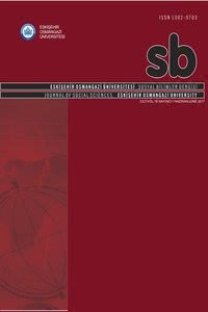KARL POPPER’DA YANLIŞLANABİLİRLİK İLKESİ VE TÜMEVARIM SORUNU
Bilginin mutlak olmadığı anlayışını benimsemiş olan Karl Popper yirminci yüzyılın birçok yazarına göre çağının en önemli felsefecilerindendir. Bu çalışmanın temel amacı Popper’ın bilim felsefesine getirdiği en önemli metodolojik yeniliklerden olan yanlışlanabilirlik ilkesi ve onun tümavarım yaklaşımı hakkında genel bir çerçeve ortaya koymaktır. Popper'e göre bilim insanları için temel hedef teorilerinin doğru olduğuna dair verileri toplamak değil, onların yanlış olduğunu kanıtlamaya çalışmaktır. Bir teorinin test edilebilmesi için, onun çürütülebilir ya da diğer bir deyişle yanlışlanabilir olup olmadığını görmek gerekmektedir. Popper tümevarım sorunu ile bilimi metafizikten ayırma edimi olarak gördüğü sınır çizme sorunu arasında paralellik kurmuştur.
Anahtar Kelimeler:
Karl Popper, Yanlışlanabilirlik İlkesi, Tümevarım, Bilim Felsefesi
The FalsIfIcatIon PrIncIple and The Problem of InductIon In Karl Popper
Karl Popper, who adopted the understanding that knowledge is not absolute, is one of the most important philosophers of his age, according to many writers of the twentieth century. The main purpose of this study is to present a general framework about the principle of falsification, which is one of the most important methodological innovations Popper brought to the philosophy of science, and his inductive approach. According to Popper, the main goal for scientists is not to collect data that their theories are correct, but to try to prove them wrong. In order for a theory to be tested, it is necessary to see whether it is refutable or, in other words, falsifiable. Popper drew a parallel between the problem of induction and the problem of demarcation, which he saw as the act of separating science from metaphysics.
Keywords:
Karl Popper, Falsification Principle, Induction, Philosophy of Science,
___
- Anddersson, G. (2016). The Problem of the Emprical Basis in Critical Rationalism. G. Stokes & J. Shearmur (Eds.), The Cambridge Companion to Popper içinde (ss. 125-142). Cambridge University Press.
- Aristoteles. (2021). Metafizik. (A. Arslan, Çev.), İstanbul: Divan Kitap.
- Bacon, F. (2015). Novum Organum. (T. Kabadayı, Çev.), Ankara: Bilgesu Yayıncılık.
- Batak, K. (2008). Bilim Tümevarım Kaynaklı mıdır ya da Tümevarım Diye Bir Şey Var mıdır? -Karl Popper'in Tümevarım Eleştirisi. M.Ü. İlahiyat Fakültesi Dergisi, 34, 237-246.
- Bowdon, T. B. (2018). Elli Felsefe Klasiği. (D. Yücel, D Balcı ve S. Türkoğlu, Çev.), İstanbul: Pegasus.
- Boyd, B. (2016). Popper’s World 3: Origins, Progress, and Import. Philosophy of the Social Sciences, 46(3), 221–241. https://doi.org/10.1177/0048393116640.
- Cevizci, A. (2017) Felsefe Tarihi. İstanbul: Say Yayınları.
- Chalmers, A. F. (2016). Bilim Dedikleri. (H. Arslan, Çev.), İstanbul: Paradigma Yayıncılık.
- Cibangu, S. K. (2012). ‘Karl Popper and the Social Sciences’. Social Sciences and Cultural Studies - Issues of Language. Public Opinion, Education and Welfare, InTech.
- Corvi, R. (2005). An Introduction to the Thought of Karl Popper. New York: Routledge.
- Çetinkaya, Ö. (2014). Karl Popper'ın Yönteminde Hipotetik-Dedüktif Formun Bilimsel İnşası. Pamukkale Üniversitesi Sosyal Bilimler Enstitüsü Dergisi, 19, 103-119.
- Demir, Ö. (1992). Bilim Felsefesi. İstanbul: Ağaç Yayıncılık.
- Johansson, I. (1982). Anglosakson Bilim Felsefesi. (Ş. Alpay, Çev.), İstanbul: Yazko Yayınevi.
- Gattei, S. (2009). Karl Popper’s Philosophy of Science. New York: Routledge.
- Gorton, W. A. (2006). Karl Popper and The Social Sciences. State University of New York.
- Hume, D. (2019). İnsanın Anlama Yetisi Üzerine Bir Soruşturma. (F. B. Aydar, Çev.).Yapı Kredi.
- Isanbor, P. O. & Dada, S. O. (2017). Karl Popper, Scientific Method, The Growth of Science Education And Development. Ekpoma Review, 4 (1), 104 -116.
- Jarvie, I. (2016). Popper’s Philosophy and the Methodology of Social Science. G. Stokes & J. Shearmur (Eds.). The Cambridge Companion to Popper içinde (ss. 284-317). Cambridge University Press.
- Magee, B. (1990). Karl Popper'ın Bilim Felsefesi ve Siyaset Kuramı. (M. Tunçay, Çev.), İstanbul: Remzi Kitapevi.
- Magee, B. (2011). Bir Filozofun İtirafları. (A. K. Kaptan, Çev.). Ankara: ODTÜ Yayıncılık.
- Maxwell, N. (2017). Karl Popper, Science and Enlightenment. Ucl Press.
- Mitra, S. (2020). An Analysis of the Falsification Criterion of Karl Popper: A Critical Review. Tattva-Journal of Philosophy, 12 (1), 1-18. https://doi.org/10.12726/tjp.23.1
- Naraniecki, A. (2010). Neo-Positivist or Neo-Kantian? Karl Popper and the Vienna Circle. Philosophy, 85 (334), 511-530. https://doi.org/10.1017/S0031819110000458
- Özlem, D. (2008). Kültür Bilimleri ve Kültür Felsefesi. Doğu Batı Yayınları.
- Pojman, L. P. (1993). “The Theory of Knowledge” Classic & Contemporary Readings. Wadsworth Publishing Company.
- Popper, K. (1979). Objective Knowledge. Oxford University Press.
- Popper, K. (2002). Conjectures and Refutations: The Growth of Scientific Knowledge. Routledge.
- Popper, K. (2003). Bilimsel Araştırmanın Mantığı. (İ. Aka ve İ. Turan, Çev.), İstanbul: Yapı Kredi.
- Popper, K. (2006). Hayat Problem Çözmektir. (A. Nalbant, Çev.), İstanbul: Yapı Kredi.
- Popper, K. (2008). Açık Toplum ve Düşmanları. (M. Tunçay ve H Rızatepe, Çev.). İstanbul: Liberte.
- Popper, K. (2009). The two fundamental problems of the theory of knowledge. New York: Routledge.
- Popper, K. (2020). Daha İyi Bir Dünya Arayışı. (İ. Aka, Çev.), İstanbul: Yapı Kredi.
- Stokes, G. ve Shearmur, J. (2016). Popper and His Philosophy: An Overview. G. Stokes & J. Shearmur (Eds.). The Cambridge Companion to Popper içinde (ss. 352-376). Cambridge University Press.
- Veronesi, C. (2014). Falsifications and scientific progress: Popper as sceptical optimist. Lett Mat Int, 1, 179–184. https://doi.org/10.1007/s40329-014-0031-7
- Warburton, N. (2023). Felsefenin Kısa Tarihi. (İ. Taşçıoğlu, Çev.), İstanbul: Alfa.
- Yaren, T. (2003). İbn Sînâ Mantığına Giriş. Ankara: Yay.
- Yıldırım, C. (1991). Bilim Felsefesi. İstanbul: Remzi.
- Başlangıç: 2000
- Yayıncı: -
Sayıdaki Diğer Makaleler
Aile Sadakatinin İhlal Edildiği Durumlarda Ergenlerin Sosyal ve Ahlaki Muhakemeleri
Türkiye İşgücü Piyasasında Yarı Zamanlı İstihdam
Sevi SERTKAYA, Etem Hakan ERGEÇ
KARL POPPER’DA YANLIŞLANABİLİRLİK İLKESİ VE TÜMEVARIM SORUNU
Makroekonomik Değişkenlerin ve Jeopolitik Risk Endeksinin Savunma Harcamalarına Etkisi
Ortak ve İşbirliğine Dayalı Eylem Bağlamında İletişim Sistemlerinin Gelişimi
Kentli Hakları Bağlamında Kentsel Yaşanabilirliğin Değerlendirilmesi: Isparta Örneği
Toplumsal Cinsiyet Bağlamında Turizm Reklam Filmlerinde Kadın İmgesi
Çevresel Kuznets Eğrisinin Türkiye'de Geçerliliği: 1970-2020 Örneği
